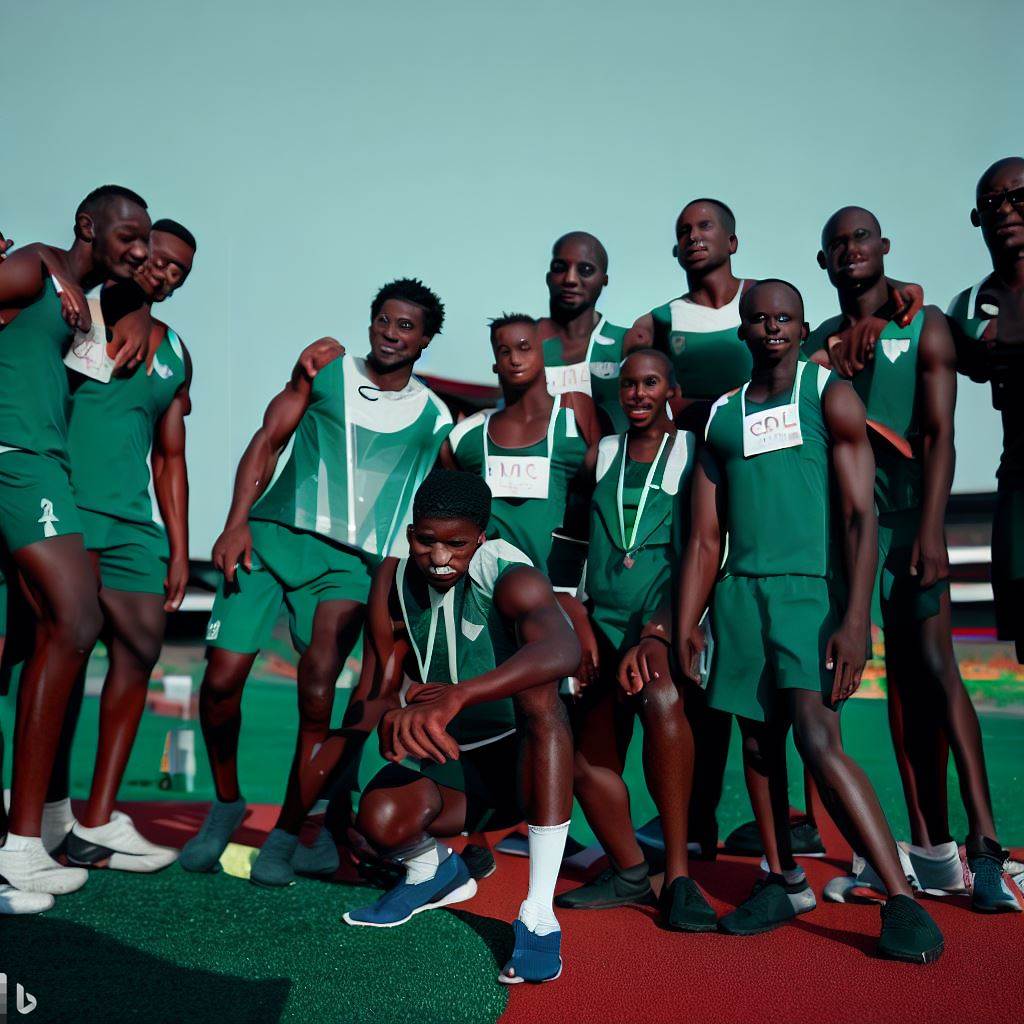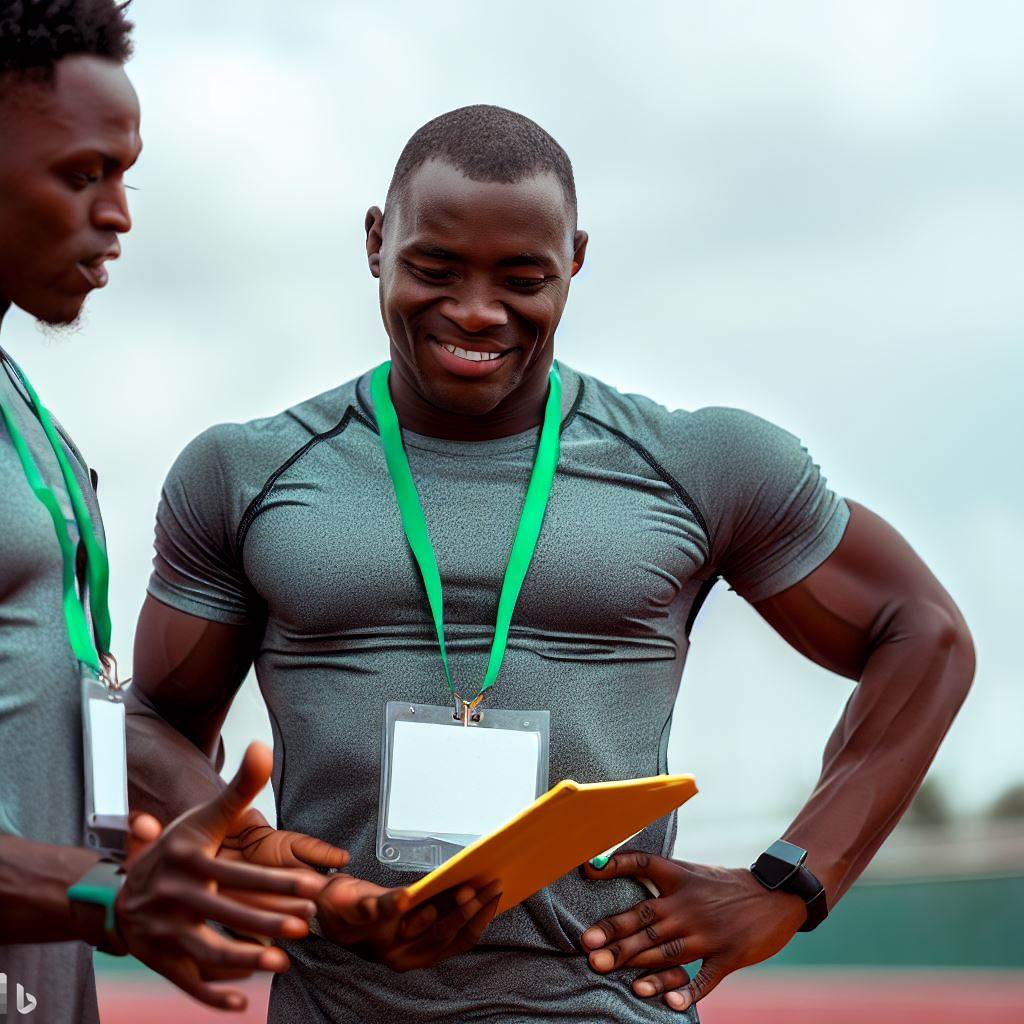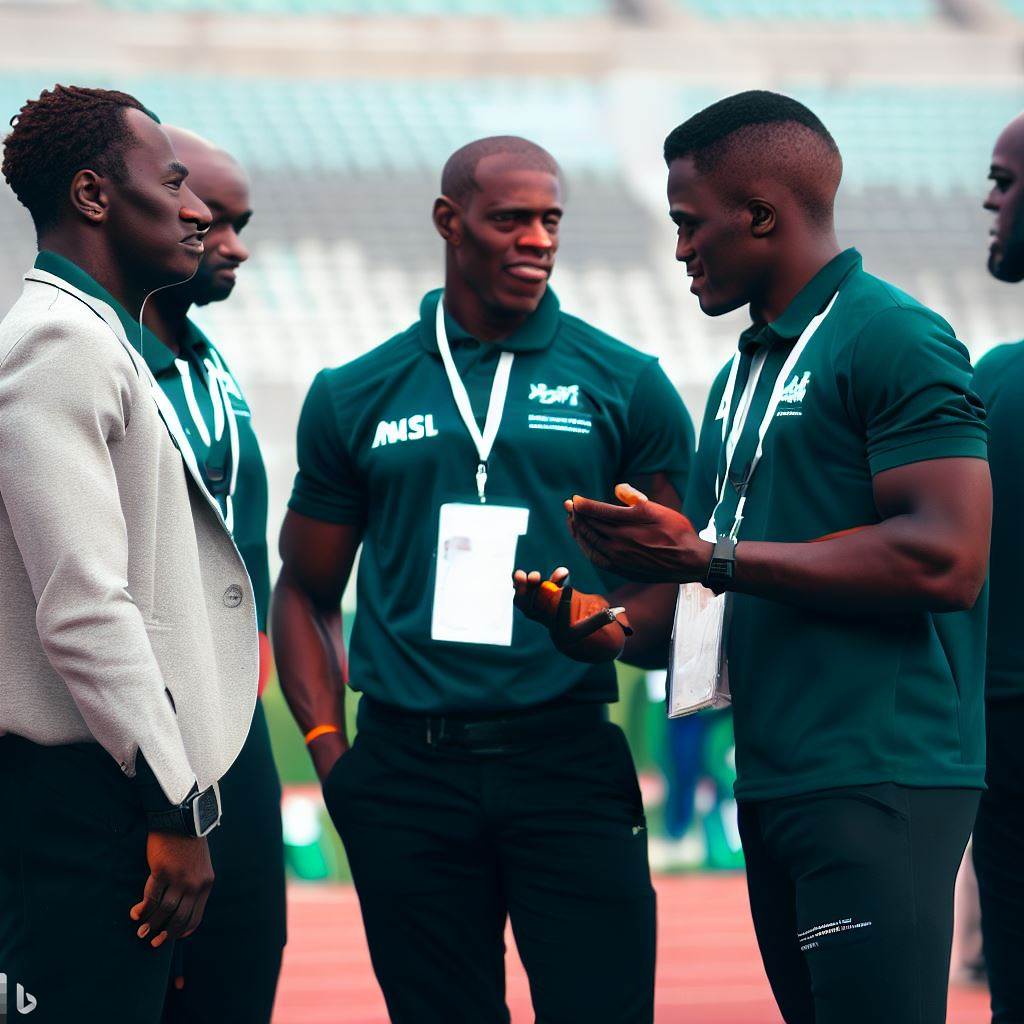Introduction
Overview of Assistant Athletic Training
Assistant athletic training involves providing support to athletes in injury prevention, assessment, and rehabilitation.
Brief introduction to the Nigerian athletic training scene
Nigeria’s athletic training scene faces numerous challenges such as limited resources, inadequate facilities, and lack of professional recognition.
The World of Assistant Athletic Training
- Defining Assistant Athletic Training: Assistant athletic training involves supporting athletes in their physical conditioning, injury prevention, and rehabilitation.
- Crucial Roles: Assistant athletic trainers play a vital role in an athlete’s performance, health, and overall well-being.
- Scope of Practice: They assist in injury assessment, design fitness programs, and provide immediate care on the field.
- Nigeria’s Athletic Ambitions: Nigeria has a rich sporting heritage with ambitions for excellence in various disciplines.
- Growing Interest: With increasing interest in sports, the demand for assistant athletic trainers has surged in Nigeria.
- Unique Challenges: Nigeria’s athletic training scene faces specific challenges like limited resources, inadequate infrastructure, and the need for educational development.
- Inadequate Facilities: Many training facilities lack proper equipment and medical support, hindering athlete development.
- Educational Gaps: There’s a need for comprehensive educational programs to train qualified assistant athletic trainers in Nigeria.
- Local Talent: Developing local talent in athletic training can boost Nigeria’s athletic success and improve athletes’ overall health.
- Future Prospects: This blog series will delve into the challenges and opportunities within the Nigerian assistant athletic training scene, offering insights from professionals striving to make a difference.
Stay tuned for our next chapter, where we explore the specific challenges faced by assistant athletic trainers in Nigeria and how they are working to overcome them.
Lack of resources
In assistant athletic training in Nigeria, there are several challenges that hinder the development of the field. One major challenge is the lack of resources, which manifests in various forms.
Limited access to modern equipment and facilities
Assistant athletic trainers in Nigeria face a significant hurdle when it comes to accessing modern equipment and facilities for their training programs.
The country lacks state-of-the-art facilities that are crucial for effective training and injury rehabilitation.
Assistant athletic trainers can’t deliver optimal care without modern equipment like ultrasound machines and electronic muscle stimulation devices.
Inadequate modern equipment restricts athlete care quality and impedes progress and research in Nigeria’s athletic training field.
Insufficient funding for training programs
Another challenge faced by assistant athletic trainers in Nigeria is the insufficient funding for training programs. Athletic training programs require financial support to train and equip trainers adequately.
Restricted funding causes training programs to lack essential resources like books and specialized courses.
Inadequate funds hinder seminars and skill enhancement, stalling growth and restricting Nigerian trainers’ professional progress.
Lack of medical supplies and advanced technologies
Assistant athletic trainers in Nigeria face yet another challenge in the form of a scarcity of medical supplies and advanced technologies.
The lack of proper medical supplies and equipment limits the ability of trainers to effectively diagnose and treat injuries.
Basic supplies like bandages, braces, and taping materials are often in short supply, making it difficult to provide immediate care to injured athletes.
Furthermore, the absence of advanced technologies such as diagnostic imaging machines like MRI and CT scans impedes accurate diagnosis and treatment planning.
This lack of medical supplies and advanced technologies not only compromises the quality of care provided but also hinders the prevention and timely management of injuries.
In essence, the challenging landscape of assistant athletic training in Nigeria is significantly influenced by the lack of resources.
Limited access to modern equipment and facilities, insufficient funding for training programs, and a scarcity of medical supplies and advanced technologies pose significant obstacles to the progress of the field.
Addressing these challenges by allocating more resources and improving funding opportunities will play a crucial role in advancing assistant athletic training in Nigeria.
Read: Top Challenges Faced by Nigerian Athletes Today
Inadequate Education and Training
Limited opportunities for specialized education in athletic training
- Nigeria’s scene in assistant athletic training faces challenges due to limited opportunities for specialized education.
- Aspiring trainers face difficulty due to limited institutions offering specialized athletic training courses, hampering skill acquisition.
- This limited access to education hampers the growth and development of assistant athletic trainers in Nigeria.
- Without proper education, trainers may not be equipped to handle the demands of their profession effectively.
- Nigeria should invest in creating more institutions that offer specialized athletic training courses to cater to the growing demand.
Lack of accredited training programs
- Another challenge faced by assistant athletic trainers in Nigeria is the lack of accredited training programs.
- Without accredited programs, the quality and effectiveness of training may be compromised.
- This lack of accreditation makes it difficult for trainers to gain recognition and credibility in the field.
- Nigeria’s sports organizations should work towards establishing accredited training programs to ensure high standards in athletic training.
- These programs should align with international standards to enhance the competence of assistant athletic trainers in Nigeria.
Insufficient mentoring and supervision for assistant athletic trainers
- The third challenge in assistant athletic training in Nigeria is the insufficient mentoring and supervision available for trainers.
- Without proper guidance and support, trainers may struggle to develop their skills and progress in their careers.
- Mentoring programs can provide valuable guidance, knowledge, and practical experience to assistant athletic trainers.
- Nigeria’s sports organizations and experienced trainers should play an active role in mentoring and supervising aspiring trainers.
- This will help bridge the gap between theory and practice, ensuring the quality of assistant athletic training in Nigeria.
Overall, the assistant athletic training scene in Nigeria faces significant challenges in terms of inadequate education and training.
Limited opportunities for specialized education, lack of accredited training programs, and insufficient mentoring and supervision hinder the growth of assistant athletic trainers in the country.
To overcome these challenges, Nigeria’s sports organizations and educational institutions should prioritize the establishment of specialized training programs, accreditation of existing programs, and the implementation of mentoring programs.
By addressing these issues, Nigeria can enhance the competence and effectiveness of assistant athletic trainers, contributing to the development of sports and athletes in the country.
Read: Promoting Sportsmanship: Lessons from Nigerian Athletes
Limited career prospects
Low demand for assistant athletic trainers in Nigeria
Despite the growing interest in sports and athletics in Nigeria, there is a low demand for assistant athletic trainers.
This is mainly due to a lack of awareness about the importance of their role in preventing and rehabilitating injuries.
Lack of professional development opportunities
Assistant athletic trainers in Nigeria face significant challenges when it comes to professional development opportunities.
There is a lack of funding and resources for workshops, conferences, and certifications, which are crucial for enhancing their skill set and staying updated with the latest advancements in the field.
Minimal job security and financial stability
Assistant athletic trainers in Nigeria often grapple with unstable jobs due to insufficient funding in organizations. This scarcity limits opportunities.
Financial insecurity hinders future planning and professional growth. Despite this, they persist in aiding athletes, though resources are scant.
Some solutions include raising awareness through campaigns, workshops, and highlight benefits of trained professionals. Forming associations for rights, mentorship, networking, and sharing best practices.
Attain funding from government and private sectors for workshops, certifications, and skills enhancement.
Collaborate with global athletic organizations for learning and exchange programs.
Advocate for security and fair pay through alliances with sports bodies and schools.
In short, Nigerian assistant athletic trainers can thrive with awareness, development, stability, and support.

Cultural and societal barriers
One of the major challenges that assistant athletic trainers in Nigeria face is cultural and societal barriers.
These barriers can have a significant impact on the recognition and support for athletic training in the country, as well as the opportunities available for female assistant athletic trainers.
Limited recognition and support for athletic training in Nigeria
Assistant athletic trainers in Nigeria encounter a significant challenge: inadequate recognition and support for their field.
Unlike developed nations, Nigeria considers athletic training unfamiliar, resulting in funding struggles, job scarcity, and unawareness about its importance.
Traditional gender roles and stereotypes affecting female assistant athletic trainers
Traditional gender roles and stereotypes in Nigeria create a cultural barrier for assistant athletic trainers, particularly females.
In many Nigerian communities, there is a belief that women should not be involved in physically demanding activities or careers.
This mindset creates significant challenges for female assistant athletic trainers who are working to establish themselves in the field.
Female trainers encounter resistance from male peers and athletes, challenging their authority and expertise acceptance. To overcome, they excel to earn respect and challenge societal norms.
Prolonged recovery period due to cultural practices such as alternative medicine
Cultural practices, such as the use of alternative medicine and traditional healing methods, can also pose challenges for assistant athletic trainers in Nigeria.
In many communities, there is a preference for traditional healing practices over modern medical treatments.
It’s crucial to tackle challenges in Nigerian assistant athletic training to prioritize athletes’ safety and well-being. Inadequate medical care heightens risks of severe injuries and long-term health issues.
By overcoming these obstacles, trainers can enact prevention strategies and offer prompt medical care, ensuring athletes’ health.
Importance of Addressing These Challenges
Ensuring Athletes’ Safety and Well-being
It’s crucial to tackle challenges in Nigerian assistant athletic training to prioritize athletes’ safety and well-being.
Inadequate medical care heightens risks of severe injuries and long-term health issues.
By overcoming these obstacles, trainers can enact prevention strategies and offer prompt medical care, ensuring athletes’ health.
Enhancing Athletic Performance and Reducing the Risk of Injuries
Addressing the challenges in assistant athletic training in Nigeria is crucial for enhancing athletic performance and minimizing the risk of injuries.
Assistant athletic trainers play a vital role in evaluating athletes’ physical conditions, designing effective training programs, and monitoring their progress.
By addressing the challenges and ensuring the presence of knowledgeable and well-equipped assistant trainers, athletes can receive the necessary support to reach their full potential and avoid unnecessary injuries.
Boosting the Overall Development of Sports in Nigeria
Addressing the challenges in assistant athletic training in Nigeria is essential for the overall development of sports in the country.
Effective athletic training programs contribute not only to individual athletes’ success but also to the advancement of sports at the national level.
Well-trained athletic trainers can identify and nurture young talents, provide guidance to coaches, and establish a strong foundation for sports development in Nigeria.
By addressing these challenges, Nigeria can strengthen its sports infrastructure and establish a reputation for producing skilled athletes on both regional and international platforms.
Summarily, the challenges in assistant athletic training in Nigeria encompass various aspects that need to be addressed promptly and effectively.
Recognizing challenges is vital for athlete safety, performance, and Nigerian sports development. Authorities, organizations must invest in conducive training.
Collaborative efforts, resources, and improvement can establish a thriving Nigerian athletic system. Let’s prioritize addressing challenges to ensure a successful future for athletes and sports.
Read: Breaking Down Nigeria’s Athletics Training Systems
Strategies to overcome the challenges
Improving access to resources through partnerships and fundraising
Nigeria’s assistant athletic trainers face numerous challenges that hinder their ability to provide optimal care to athletes.
One key strategy to overcome these challenges is improving access to resources through partnerships and fundraising.
By forming partnerships with sports organizations, medical institutions, and other relevant stakeholders, assistant athletic trainers can create collaboration opportunities that can lead to increased access to resources.
This can include access to state-of-the-art sports rehab facilities, advanced medical equipment, and educational opportunities.
Fundraising efforts can also play a crucial role in improving resource accessibility. By organizing events such as charity runs or sports tournaments, assistant athletic trainers can raise funds to support their programs.
These funds can be utilized to purchase necessary equipment, provide scholarships for aspiring athletic trainers, and fund research projects.
Establishing accredited training programs and promoting education in athletic training
To overcome the challenges faced by assistant athletic trainers in Nigeria’s scene, it is crucial to establish accredited training programs and promote education in athletic training.
Creating and implementing standardized training programs in collaboration with recognized sports medicine associations and educational institutions can ensure that assistant athletic trainers receive proper education and develop the necessary skills and knowledge.
Promoting education in athletic training can be done through awareness campaigns, workshops, and conferences that target aspiring athletic trainers, sports professionals, and healthcare providers.
These initiatives can help raise awareness about the importance of athletic training and attract individuals who are passionate about pursuing a career in this field.
Advocating for recognition and support from governmental and non-governmental organizations
To overcome the challenges in assistant athletic training in Nigeria, it is crucial to advocate for recognition and support from governmental and non-governmental organizations.
Assistant athletic trainers can actively engage with policymakers, sports governing bodies, and relevant organizations to emphasize the importance of their role in athlete health and performance.
By highlighting the impact of athletic training on sports and the overall well-being of athletes, these professionals can garner support for their cause.
Advocacy efforts should also focus on securing funding and resources from government agencies and non-governmental organizations.
By demonstrating the positive outcomes that can be achieved through investing in assistant athletic training, these professionals can attract financial support that will enable them to overcome the challenges they currently face.
Creating awareness about the significance of athletic training and its impact on sports
An essential strategy to overcome the challenges in assistant athletic training in Nigeria is creating awareness about its significance and impact on sports.
Assistant athletic trainers can collaborate with sports media outlets, sports organizations, and influential individuals to educate the public about the crucial role they play in ensuring athletes’ health and performance.
This can be achieved through interviews, articles, seminars, and social media campaigns aimed at spreading information and debunking myths about athletic training.
Furthermore, assistant athletic trainers can actively engage with schools and sports clubs to deliver educational sessions on injury prevention, rehabilitation, and the overall importance of proper athletic training.
By targeting young athletes and their coaches, these professionals can instill a culture of informed and proactive sports preparation.
Overall, by implementing these strategies, assistant athletic trainers in Nigeria can overcome the numerous challenges they face, improve the quality of care for athletes, and contribute to the development of a robust athletic training system.
Read: Starting Your Journey in Nigeria’s Athletics Profession
Gain More Insights: Exploring Nigeria’s Sports Talent Development Programs
Success stories and initiatives
Highlighting individuals or organizations that have made strides in assistant athletic training in Nigeria
- The Nigerian Athletic Trainers’ Association (NATA) has been at the forefront of advocating for the development of assistant athletic training in Nigeria. They have successfully collaborated with various sports organizations to provide training opportunities for aspiring assistants.
- Coach Samson Emmanuel, a former national athlete turned certified athletic trainer, has made significant strides in assistant athletic training in Nigeria. He established his private training center where he provides quality training to athletes and mentorship to aspiring assistants.
- The Nigerian Ministry of Sports recognizes the importance of assistant athletic training and has partnered with international organizations to bring in expert trainers to enhance the skills of local trainers.
Showcasing successful programs or initiatives implemented to address the challenges
- The Sports Development Program initiated by the Nigerian Olympic Committee has implemented a comprehensive plan to address the challenges in assistant athletic training. This includes organizing training workshops, providing resources to sports organizations, and supporting research in athletic training.
- The Federal Sports College in Nigeria has established a dedicated department for assistant athletic training, offering specialized courses and practical training to aspiring assistants. The program has produced skilled and qualified assistants who are now working with various sports teams and athletes.
- The National Association of Nigerian Coaches (NANCO) launched a mentorship program that pairs experienced athletic trainers with aspiring assistants. This initiative has been successful in providing guidance and support to young professionals in the field.
Sharing inspiring stories of athletes who have benefited from quality assistant athletic training
- Sandra Olu, a young sprinter from Nigeria, had been struggling with recurring knee injuries. Through proper assessment and treatment by an assistant athletic trainer, she was able to recover and achieve her personal best in the national championship.
- Emmanuel Eze, a promising football player, suffered a severe ankle sprain during a training session. Thanks to the prompt and effective intervention of an assistant athletic trainer on the field, he was able to return to the game and contribute to his team’s victory.
- Brenda Okocha, a long-distance runner, participated in an intensive training program conducted by an assistant athletic trainer. Under their guidance, she improved her endurance and technique, leading her to compete at the international level and achieve remarkable results.
Explore Further: How Nigeria’s Athletics Sector Influences Youth
Publish Your Professional Profile, Business or Brand
Showcase your expertise, gain trust, and boost visibility instantly on Professions.ng.
Publish NowConclusion
A recap of the challenges faced in assistant athletic training in Nigeria
In this chapter, we have examined the various challenges encountered by assistant athletic trainers in Nigeria.
These challenges include limited resources, lack of proper facilities, inadequate funding, and insufficient awareness and support.
Reinforcement of the importance of addressing these challenges
It is crucial to address these challenges as they directly impact the quality of healthcare provided to athletes in Nigeria.
Assistant athletic trainers play a vital role in ensuring the well-being and performance of athletes, and addressing these challenges will enable them to fulfill their responsibilities effectively.
Call to action for increased support, resources, and awareness in assistant athletic training in Nigeria
To conquer these hurdles, government, sports groups, and businesses must boost assistance. This includes funding, adequate resources, and awareness.
By overcoming these obstacles and investing in assistant athletic training, Nigeria can enhance athlete healthcare, boost performance, and advance sports.
Let’s unite to ensure Nigerian assistant athletic trainers possess support, resources, and awareness for optimal athlete care and success.




